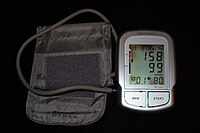
Photo from wikipedia
Funduscopic examination has long been recognized as the most affordable way to assess the condition of small diameter vessels. However, accumulation of new research data, changes in the requirements for… Click to show full abstract
Funduscopic examination has long been recognized as the most affordable way to assess the condition of small diameter vessels. However, accumulation of new research data, changes in the requirements for the management of patients with various diseases require a return to the clinical, prognostic significance of fundoscopy and the specification of indications for its conduction in certain situations. This article discusses the prevalence of retinopathy depending on the etiological factor, criteria and stages of its development. Until now, a number of issues regarding retinopathy have not been finally resolved, in particular the classification optimal for routine practice, method of its study, etc. It is believed that changes in the fundus blood vessels reflect parallel changes in the vessels of other regions, but this is not always so. A moderate prognostic value of “mild” retinopathy has been established in terms of the risk of cardiovascular diseases, with moderate retinopathy, this relationship reaches a strong level, and with a malignant one, there is a strong correlation with death. The article discusses indications for fundoscopy in routine clinical practice, taking into account the latest scientific data and international recommendations. For the treatment of hypertensive retinopathy, only adequate control of blood pressure is recommended, which can reduce the signs of retinopathy. The authors concluded that the prognostic value of stage 1–2 hypertensive retinopathy is minimal and does not affect patient management. The latter eliminates the need for fundoscopy in patients with mild, controlled arterial hypertension, not suffering from diabetes, with the exception of young patients. Fundoscopy is required in patients with difficult-to-control and resistant arterial hypertension, high variability of blood pressure.
Journal Title: HYPERTENSION
Year Published: 2021
Link to full text (if available)
Share on Social Media: Sign Up to like & get
recommendations!